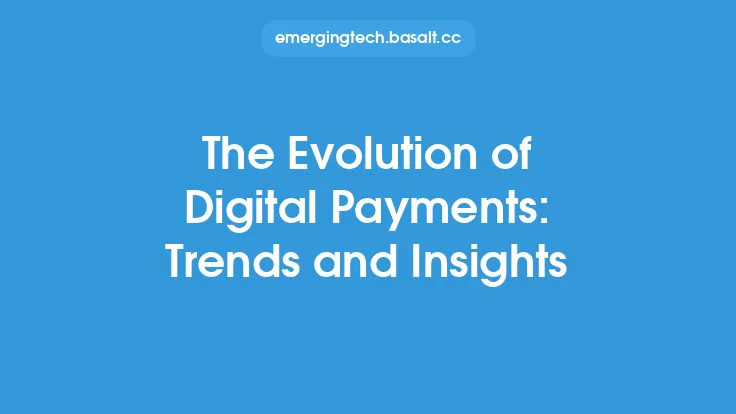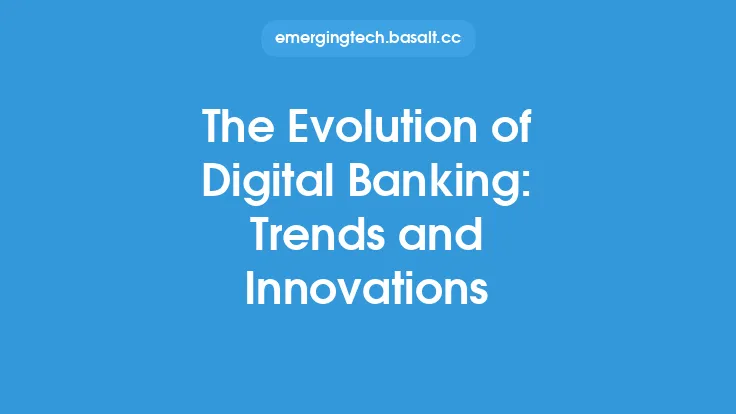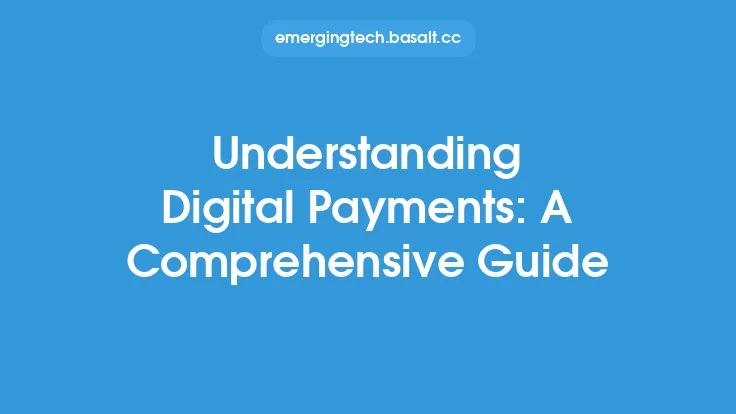The world of financial transactions has undergone a significant transformation with the advent of digital payments. Gone are the days of physical currency and traditional payment methods, as digital payments have revolutionized the way we make and receive payments. At the heart of this revolution are the benefits of digital payments, which offer unparalleled convenience, speed, and efficiency. In this article, we will delve into the advantages of digital payments and explore how they have transformed the financial landscape.
Introduction to Digital Payments
Digital payments refer to the electronic transfer of funds from one party to another, using a variety of devices such as smartphones, computers, and point-of-sale terminals. This mode of payment has gained widespread acceptance due to its ease of use, speed, and convenience. Digital payments can be made using various methods, including credit/debit cards, online banking, mobile wallets, and cryptocurrencies. The underlying technology that enables digital payments is complex and involves a network of financial institutions, payment processors, and technology providers.
Convenience of Digital Payments
One of the primary benefits of digital payments is the convenience they offer. With digital payments, users can make transactions from anywhere, at any time, using their mobile devices or computers. This eliminates the need to physically visit a bank or a payment terminal, saving time and effort. Additionally, digital payments enable users to store their payment information securely, making it easy to make repeat transactions without having to enter their details every time. The convenience of digital payments has also led to an increase in online shopping, as users can now make payments quickly and easily from the comfort of their own homes.
Speed of Digital Payments
Digital payments are also characterized by their speed, with most transactions being processed in real-time. This is in contrast to traditional payment methods, which can take several days to process. The speed of digital payments is made possible by the use of advanced technology, including high-speed payment processing systems and secure data transmission protocols. The speed of digital payments has numerous benefits, including the ability to make time-sensitive transactions, such as paying bills or making investments. Furthermore, the speed of digital payments has also enabled the development of new financial products and services, such as instant loans and same-day settlements.
Efficiency of Digital Payments
Digital payments are also highly efficient, reducing the need for physical currency and minimizing the risk of errors. With digital payments, transactions are processed automatically, eliminating the need for manual intervention. This reduces the risk of human error, which can lead to incorrect transactions or lost payments. Additionally, digital payments enable users to track their transactions in real-time, making it easy to monitor their finances and detect any suspicious activity. The efficiency of digital payments has also led to a reduction in costs, as financial institutions and businesses no longer need to invest in physical infrastructure, such as payment terminals and cash handling equipment.
Technical Aspects of Digital Payments
From a technical perspective, digital payments involve a complex network of systems and protocols. At the heart of digital payments is the payment processing system, which enables the transfer of funds between parties. This system typically involves a payment gateway, which acts as an intermediary between the user's device and the financial institution's system. The payment gateway is responsible for authenticating the user, verifying the transaction details, and transmitting the payment information to the financial institution. The financial institution then processes the payment, using a variety of protocols, including the Secure Sockets Layer (SSL) and Transport Layer Security (TLS) protocols, to ensure the secure transmission of data.
Security of Digital Payments
The security of digital payments is a critical aspect of their operation. To ensure the secure transmission of data, digital payment systems use advanced encryption techniques, such as public-key cryptography and symmetric-key cryptography. These techniques enable the secure transmission of sensitive information, such as payment details and personal data. Additionally, digital payment systems also use secure authentication protocols, such as two-factor authentication and biometric authentication, to verify the identity of users. The security of digital payments has also been enhanced by the use of machine learning algorithms and artificial intelligence, which enable the detection of suspicious activity and the prevention of fraudulent transactions.
Impact of Digital Payments on Businesses
The impact of digital payments on businesses has been significant, enabling them to reach a wider audience and increase their sales. With digital payments, businesses can now accept payments from customers anywhere in the world, using a variety of devices and payment methods. This has enabled businesses to expand their customer base and increase their revenue. Additionally, digital payments have also enabled businesses to reduce their costs, by minimizing the need for physical infrastructure and reducing the risk of errors. The impact of digital payments on businesses has also been felt in the area of customer service, as businesses can now provide their customers with a seamless and convenient payment experience.
Conclusion
In conclusion, the benefits of digital payments are numerous, offering unparalleled convenience, speed, and efficiency. The convenience of digital payments has enabled users to make transactions from anywhere, at any time, using their mobile devices or computers. The speed of digital payments has enabled the development of new financial products and services, such as instant loans and same-day settlements. The efficiency of digital payments has reduced the need for physical currency and minimized the risk of errors. As the world of financial transactions continues to evolve, it is likely that digital payments will play an increasingly important role, enabling users to make secure, convenient, and efficient transactions.





